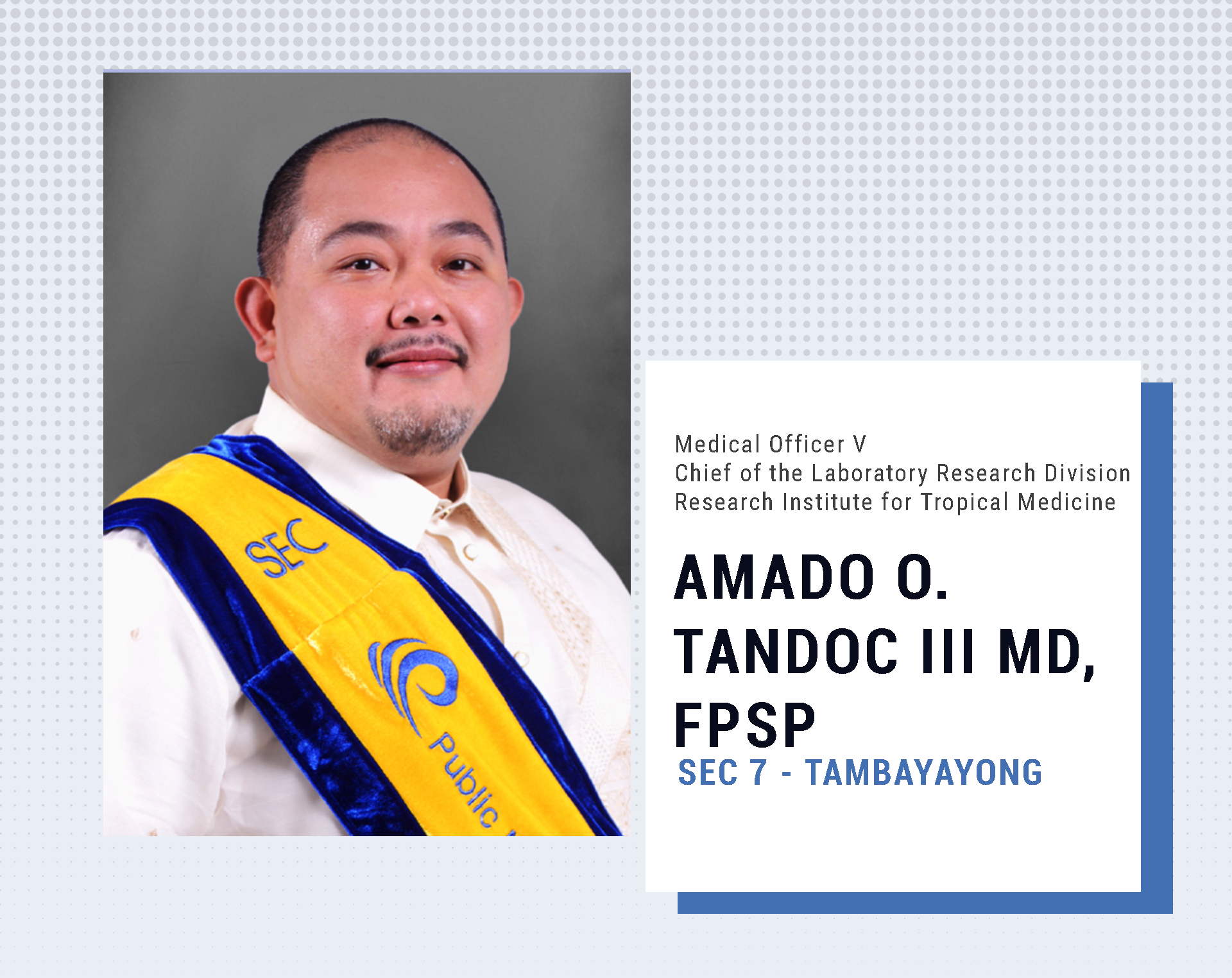
A tribute to heroes of the pandemic would be incomplete without mentioning Amado O. Tandoc III, MD, FPSP, Medical Officer V – Chief of the Laboratory Research Division (LRD) of the Research Institute for Tropical Medicine (RITM). His agency’s huge responsibility was to squarely face the challenges brought about by the global health crisis of Covid19 and protect the people.
The immense contributions of Dr. Tandoc III earned him praise from colleagues and a recognition from the Philippine Society of Pathologists, naming him Pathologist of the Year! Indeed, a felicitous award due him.
Dr. Tandoc III has been acknowledged for his tireless and monumental efforts for the changes he implemented at the RITM. He shared that the agencyadopted an Incident Command System strategy to manage and support the operations of the hospital and the laboratory in mounting and sustaining the response to COVID-19. “We knew that one laboratory department cannot do this alone with its own staff, equipment, and facilities so we restructured the whole laboratory division and other operating units to come up with an end-to-end process from receiving of specimens to release of results.”, Dr. Tandoc III enthused. He stated that three testing streams were organized through partnerships with six laboratory departments. RITM’s Epidemiology and Biostatistics Department teamed up with their IT Department and Surveillance Unit to establish a COVID-19 laboratory information system. Their Administrative and Finance Divisions supported the hospital and laboratory with supplies and re-agents, personal protective equipment, food, accommodation, and transportation. He also saw the importance of organizing teams and groups for the non-testing units as they are equally important functions of the Institute covering training of medical technologists for safe specimen collection and molecular testing, setting up and conducting assessment of COVID-19 laboratories nationwide, and evaluation of diagnostic kits for use by the COVID-19 labs.
On top of this, currently, Dr. Tandoc III is part of the Project Management Team of the Philippine National Influenza Center of RITM. He supervises, coordinates, and monitors the training and clinical referral services of the Laboratory Research Division. He is a member of the Technical Working Group on the 2015-2019 Strategic Plan for Expanded Program on Immunization (DPO 2014-7470), and a faculty and facilitator of the Hospital Management Training for Ebola Virus Disease Preparedness. Dr. Tandoc III is also the Chair of the Department of Health’s Committee on Quality Assurance of Public Health Programs with Laboratory Services.
Dr. Tandoc III wears many more hats. He is the Chair of the Committee on Publications of the Philippine Society of Pathologists, Inc., and the Editor-in-Chief of the Philippine Journal of Pathology and SCOPE, the official newsletter of the Philippine Society of Pathologists. He is also a peer reviewer at the World Health Organization Bulletin, an editorial coordinator at the Journal of ASEAN Federation of Endocrine Associations (JAFES), and a copy editor at the Acta Medica Philippina.
An anatomic and clinical physician, Dr. Tandoc III took up his Doctor of Medicine at the University of Santo Tomas, where he also graduated magna cum laude in BS Biology.
Dr. Tandoc III attributes his achievements which led the award to the learnings and insights he gained as a scholar of the Senior Executives Class (SEC) Batch 7 – Tambayayong. Being the first from RITM to participate in the Senior Executives Class, Dr. Tandoc III recalls how being part of the Program was not an easy feat. It was difficult and challenging, but a new and fruitful experience as he recounts. Dr. Tandoc III marvels at being able to meet very inspiring and accomplished mentors during his residential training, as well as building long lasting relationships and networks with his Tambayayong classmates. The formal and structured approach of the Program matched his expectations of an academic training that would hone or further enhance his skills in management and supervision. He views his acceptance to the Program as a worthwhile and fortunate event in his life, as the course validated the directions and initiatives that he has been working on.
The PMDP has made him realize that a lot of improvements have yet to be done, not just in handling people and addressing problems, but more so, in looking at and valuing his life and his role in government. “I do not honestly think that I am at that point where I can say I am successful — but my learnings in PMDP are guiding me. PMDP taught me that leaders cannot and should not be satisfied with what we have now; that senior executives are meant to be catalysts for change; that change is possible, but it should start from me. These learnings guided me when I returned to my home agency. There are really a lot of challenges working in government, and I do understand the clamor of the people for better governance, better systems, better lives. I must also serve as an inspiration to move and guide others to be part of the ‘wave of change’.”
Deeply appreciating the Program’s huge impact and direction in his life, Dr. Tandoc III would like to impart this message to public servants who aspire as scholars and be formed the PMDP way, “Take that first step and apply to this Program.”


